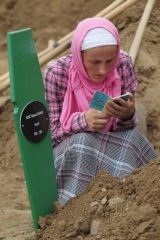On this day twenty years ago, Serbian paramilitary erected barricades in Sarajevo, effectively dividing and encircling the capital city of Bosnia and Herzegovina, beginning the longest siege in modern history during which some 11,000 people were killed.
The Sarajevo siege marked the beginning of a brutal three-year conflict which resulted in more than 100,000 dead, over a million expelled, and systematic campaigns of rape and persecution, bringing back the images of emaciated inmates of concentration camps unseen on European soil since World War II.
The atrocities committed in Bosnia forced the international community to react, and in 1993 the first international war crimes court since Nuremberg and Tokyo Tribunals was established. Out of 161 persons indicted by the International Criminal Tribunal for the Former Yugoslavia, the vast majority were charged with crimes committed on the territory of Bosnia and Herzegovina.
Ever since the war ended with the Dayton Peace Accords signed in November 1995, the country has been undergoing a slow and painful process of addressing the legacy of crimes committed during the conflict. War crimes cases are being heard at the State Court in Sarajevo and district courts around the country. There have been several failed attempts to form a truth commission, and Bosnia is central to the current initiative to establish a regional truth-seeking body, REKOM.
The search of the disappeared people continues with some 9,500 still registered as missing. Although some victims’ families receive assistance from regional governments, a comprehensive victims’ reparations law is still to be adopted at the state level. The same goes for memorials, they have been erected primarily in areas where victims belong to the majority ethnic groups, but there is no agreement at the level of the state on a law that would allow memorials in places where crimes occurred.
In this podcast Refik Hodzic, our communications director and a Bosnian justice activist and journalist, discusses the obstacles Bosnia is facing in achieving a reckoning with its troubled recent past.
Listen to the podcast
[Download](/sites/default/files/Hodzic_ICTJ_Podcast_04062012.mp3) | Duration: 10:17mins | File size: 5.88MBPhoto: A women reads from religious text at a fresh grave in the Potocari cemetery and memorial near Srebrenica, July 11, 2011. Sean Gallup/Getty Images.
